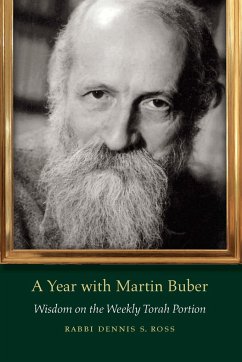20,99 €
inkl. MwSt.
Versandfertig in über 4 Wochen

10 °P sammeln
- Broschiertes Buch
- Merkliste
- Auf die Merkliste
- Bewerten Bewerten
- Teilen
- Produkt teilen
- Produkterinnerung
- Produkterinnerung
In A Year with Martin Buber, the first Torah commentary to focus on his life’s work, we experience the fifty-four weekly portions and eleven Jewish holidays through Buber’s eyes.
Andere Kunden interessierten sich auch für
![The Precious and Sacred Writings of Martin Luther ... Based on the Kaiser Chronological Edition, With References to the Erlangen and Walch Editions; The Precious and Sacred Writings of Martin Luther ... Based on the Kaiser Chronological Edition, With References to the Erlangen and Walch Editions;]() Martin LutherThe Precious and Sacred Writings of Martin Luther ... Based on the Kaiser Chronological Edition, With References to the Erlangen and Walch Editions;26,99 €
Martin LutherThe Precious and Sacred Writings of Martin Luther ... Based on the Kaiser Chronological Edition, With References to the Erlangen and Walch Editions;26,99 €![Martin Luther's Recycle Bin Martin Luther's Recycle Bin]() Martin Luther's Recycle Bin13,99 €
Martin Luther's Recycle Bin13,99 €![The Precious and Sacred Writings of Martin Luther ... Based on the Kaiser Chronological Edition, With References to the Erlangen and Walch Editions; The Precious and Sacred Writings of Martin Luther ... Based on the Kaiser Chronological Edition, With References to the Erlangen and Walch Editions;]() Martin LutherThe Precious and Sacred Writings of Martin Luther ... Based on the Kaiser Chronological Edition, With References to the Erlangen and Walch Editions;26,99 €
Martin LutherThe Precious and Sacred Writings of Martin Luther ... Based on the Kaiser Chronological Edition, With References to the Erlangen and Walch Editions;26,99 €![Ten Makers of Modern Protestant Thought Schweitzer, Rauschenbusch, Temple, Kierkegaard, Barth, Brunner, Niebuhr, Tillich, Bultmann, Buber Ten Makers of Modern Protestant Thought Schweitzer, Rauschenbusch, Temple, Kierkegaard, Barth, Brunner, Niebuhr, Tillich, Bultmann, Buber]() Ten Makers of Modern Protestant Thought Schweitzer, Rauschenbusch, Temple, Kierkegaard, Barth, Brunner, Niebuhr, Tillich, Bultmann, Buber18,99 €
Ten Makers of Modern Protestant Thought Schweitzer, Rauschenbusch, Temple, Kierkegaard, Barth, Brunner, Niebuhr, Tillich, Bultmann, Buber18,99 €![The Influence of Martin Bucer on England The Influence of Martin Bucer on England]() Lilly StiegelmeierThe Influence of Martin Bucer on England18,99 €
Lilly StiegelmeierThe Influence of Martin Bucer on England18,99 €![Thérèse Martin Thérèse Martin]() Rosemary HaughtonThérèse Martin24,99 €
Rosemary HaughtonThérèse Martin24,99 €![Watchwords For The Warfare Of Life, From Dr. Martin Luther Watchwords For The Warfare Of Life, From Dr. Martin Luther]() Martin LutherWatchwords For The Warfare Of Life, From Dr. Martin Luther23,99 €
Martin LutherWatchwords For The Warfare Of Life, From Dr. Martin Luther23,99 €-
-
-
In A Year with Martin Buber, the first Torah commentary to focus on his life’s work, we experience the fifty-four weekly portions and eleven Jewish holidays through Buber’s eyes.
Hinweis: Dieser Artikel kann nur an eine deutsche Lieferadresse ausgeliefert werden.
Hinweis: Dieser Artikel kann nur an eine deutsche Lieferadresse ausgeliefert werden.
Produktdetails
- Produktdetails
- Verlag: Jewish Publication Society
- Seitenzahl: 320
- Erscheinungstermin: 1. Dezember 2021
- Englisch
- Abmessung: 228mm x 149mm x 17mm
- Gewicht: 438g
- ISBN-13: 9780827614659
- ISBN-10: 0827614659
- Artikelnr.: 61404523
- Herstellerkennzeichnung
- Libri GmbH
- Europaallee 1
- 36244 Bad Hersfeld
- gpsr@libri.de
- Verlag: Jewish Publication Society
- Seitenzahl: 320
- Erscheinungstermin: 1. Dezember 2021
- Englisch
- Abmessung: 228mm x 149mm x 17mm
- Gewicht: 438g
- ISBN-13: 9780827614659
- ISBN-10: 0827614659
- Artikelnr.: 61404523
- Herstellerkennzeichnung
- Libri GmbH
- Europaallee 1
- 36244 Bad Hersfeld
- gpsr@libri.de
Dennis Ross
Acknowledgments Introduction I. Genesis (Bere’shit) Bere’shit: Standing Over Against Noä: Learning to Be Present Lekh Lekha: Eternal Thou Va-yera’: Many Forms of Candor H
ayyei Sarah: Rising from Grief Toledot: How Conflict Begins Va-yetse’: When Time and Space Become Secondary Va-yishlah
: Holy Insecurity Va-yeshev: On the Narrow Ridge Mikkets: Trapped in a Dream Va-yiggash: Learning to Put Feelings into Words Va-yeh
i: The Importance of Supportive Relationship II. Exodus (Shemot) Shemot: Get Off the Road Va-’era’: Reification Bo’: History as Strangers, Responsibility as Redeemers Be-shallah
: Daily Spiritual Practice Yitro: All of Us, Together at Sinai Mishpatim: Respecting Religious Difference Terumah: Not Within, Between Tetsavveh: The Sanctity of Decision Making Ki Tissa’: Eclipse of God Va-yak’hel: Shabbat as Cornerstone Pekudei: There Is No Sin in Having Money III. Leviticus (Va-yikra’) Va-yikra’: Will and Grace Tsav: The Afterglow Shemini: Learning from Loss Tazriä: Healing through Meeting Metsorä: Faith and Science Together ’Ah
arei Mot: The Curtain Will Part Kedoshim: Hebrew Humanism ’Emor: Magic, Manipulation, and Prayer Be-har: Intersection of Land and Justice Be-h
ukkotai: Mountains in Time IV. Numbers (Be-midbar) Be-midbar: Holiness in Time Naso’: Words That Bless Children Be-häalotekha: Eternal Thou Shelä-Lekha: People Want Proof Korah
: When Politics Take a Horrible Turn H
ukkat: On Jewish Law Balak: Quick and Decisive Punishment Pinh
as: Evolving Jewish Law Mattot: “Imagine the Real” Mase
ei: Interfaith Relations V. Deuteronomy (Devarim) Devarim: Dealing with Anger Va-’eth
annan: Chosenness and Universalism
Ekev: Spirituality of Eating Re’eh: Privilege and Responsibility Shofetim: Ends and Means Ki Tetse’: Animal Well-Being Ki Tavo’: The Fugitives Nitsavim: Equality in Labor Va-yelekh: Wanting More Time Ha’azinu: Children in Poetry Ve-zo’t Ha-berakhah: When There Are No Words VI. Holidays Rosh Hashanah: Where Are You? Yom Kippur: New Thinking Sukkot: The Holiday Shemini Atzeret: Sudden Stop Sim
at Torah: When You Come to the End Hanukkah: Because We Never Really Get There Purim: A Day Like Yom Kippur Pesach: “Education of Character” Yom ha-Shoah: Nuance in Reconciliation Yom ha-Atzmaut: A Growing Outcome Shavuot: Revelation, Then and Now Epigraph Source Acknowledgments Notes Selected Bibliography
ayyei Sarah: Rising from Grief Toledot: How Conflict Begins Va-yetse’: When Time and Space Become Secondary Va-yishlah
: Holy Insecurity Va-yeshev: On the Narrow Ridge Mikkets: Trapped in a Dream Va-yiggash: Learning to Put Feelings into Words Va-yeh
i: The Importance of Supportive Relationship II. Exodus (Shemot) Shemot: Get Off the Road Va-’era’: Reification Bo’: History as Strangers, Responsibility as Redeemers Be-shallah
: Daily Spiritual Practice Yitro: All of Us, Together at Sinai Mishpatim: Respecting Religious Difference Terumah: Not Within, Between Tetsavveh: The Sanctity of Decision Making Ki Tissa’: Eclipse of God Va-yak’hel: Shabbat as Cornerstone Pekudei: There Is No Sin in Having Money III. Leviticus (Va-yikra’) Va-yikra’: Will and Grace Tsav: The Afterglow Shemini: Learning from Loss Tazriä: Healing through Meeting Metsorä: Faith and Science Together ’Ah
arei Mot: The Curtain Will Part Kedoshim: Hebrew Humanism ’Emor: Magic, Manipulation, and Prayer Be-har: Intersection of Land and Justice Be-h
ukkotai: Mountains in Time IV. Numbers (Be-midbar) Be-midbar: Holiness in Time Naso’: Words That Bless Children Be-häalotekha: Eternal Thou Shelä-Lekha: People Want Proof Korah
: When Politics Take a Horrible Turn H
ukkat: On Jewish Law Balak: Quick and Decisive Punishment Pinh
as: Evolving Jewish Law Mattot: “Imagine the Real” Mase
ei: Interfaith Relations V. Deuteronomy (Devarim) Devarim: Dealing with Anger Va-’eth
annan: Chosenness and Universalism
Ekev: Spirituality of Eating Re’eh: Privilege and Responsibility Shofetim: Ends and Means Ki Tetse’: Animal Well-Being Ki Tavo’: The Fugitives Nitsavim: Equality in Labor Va-yelekh: Wanting More Time Ha’azinu: Children in Poetry Ve-zo’t Ha-berakhah: When There Are No Words VI. Holidays Rosh Hashanah: Where Are You? Yom Kippur: New Thinking Sukkot: The Holiday Shemini Atzeret: Sudden Stop Sim
at Torah: When You Come to the End Hanukkah: Because We Never Really Get There Purim: A Day Like Yom Kippur Pesach: “Education of Character” Yom ha-Shoah: Nuance in Reconciliation Yom ha-Atzmaut: A Growing Outcome Shavuot: Revelation, Then and Now Epigraph Source Acknowledgments Notes Selected Bibliography
Acknowledgments Introduction I. Genesis (Bere’shit) Bere’shit: Standing Over Against Noä: Learning to Be Present Lekh Lekha: Eternal Thou Va-yera’: Many Forms of Candor H
ayyei Sarah: Rising from Grief Toledot: How Conflict Begins Va-yetse’: When Time and Space Become Secondary Va-yishlah
: Holy Insecurity Va-yeshev: On the Narrow Ridge Mikkets: Trapped in a Dream Va-yiggash: Learning to Put Feelings into Words Va-yeh
i: The Importance of Supportive Relationship II. Exodus (Shemot) Shemot: Get Off the Road Va-’era’: Reification Bo’: History as Strangers, Responsibility as Redeemers Be-shallah
: Daily Spiritual Practice Yitro: All of Us, Together at Sinai Mishpatim: Respecting Religious Difference Terumah: Not Within, Between Tetsavveh: The Sanctity of Decision Making Ki Tissa’: Eclipse of God Va-yak’hel: Shabbat as Cornerstone Pekudei: There Is No Sin in Having Money III. Leviticus (Va-yikra’) Va-yikra’: Will and Grace Tsav: The Afterglow Shemini: Learning from Loss Tazriä: Healing through Meeting Metsorä: Faith and Science Together ’Ah
arei Mot: The Curtain Will Part Kedoshim: Hebrew Humanism ’Emor: Magic, Manipulation, and Prayer Be-har: Intersection of Land and Justice Be-h
ukkotai: Mountains in Time IV. Numbers (Be-midbar) Be-midbar: Holiness in Time Naso’: Words That Bless Children Be-häalotekha: Eternal Thou Shelä-Lekha: People Want Proof Korah
: When Politics Take a Horrible Turn H
ukkat: On Jewish Law Balak: Quick and Decisive Punishment Pinh
as: Evolving Jewish Law Mattot: “Imagine the Real” Mase
ei: Interfaith Relations V. Deuteronomy (Devarim) Devarim: Dealing with Anger Va-’eth
annan: Chosenness and Universalism
Ekev: Spirituality of Eating Re’eh: Privilege and Responsibility Shofetim: Ends and Means Ki Tetse’: Animal Well-Being Ki Tavo’: The Fugitives Nitsavim: Equality in Labor Va-yelekh: Wanting More Time Ha’azinu: Children in Poetry Ve-zo’t Ha-berakhah: When There Are No Words VI. Holidays Rosh Hashanah: Where Are You? Yom Kippur: New Thinking Sukkot: The Holiday Shemini Atzeret: Sudden Stop Sim
at Torah: When You Come to the End Hanukkah: Because We Never Really Get There Purim: A Day Like Yom Kippur Pesach: “Education of Character” Yom ha-Shoah: Nuance in Reconciliation Yom ha-Atzmaut: A Growing Outcome Shavuot: Revelation, Then and Now Epigraph Source Acknowledgments Notes Selected Bibliography
ayyei Sarah: Rising from Grief Toledot: How Conflict Begins Va-yetse’: When Time and Space Become Secondary Va-yishlah
: Holy Insecurity Va-yeshev: On the Narrow Ridge Mikkets: Trapped in a Dream Va-yiggash: Learning to Put Feelings into Words Va-yeh
i: The Importance of Supportive Relationship II. Exodus (Shemot) Shemot: Get Off the Road Va-’era’: Reification Bo’: History as Strangers, Responsibility as Redeemers Be-shallah
: Daily Spiritual Practice Yitro: All of Us, Together at Sinai Mishpatim: Respecting Religious Difference Terumah: Not Within, Between Tetsavveh: The Sanctity of Decision Making Ki Tissa’: Eclipse of God Va-yak’hel: Shabbat as Cornerstone Pekudei: There Is No Sin in Having Money III. Leviticus (Va-yikra’) Va-yikra’: Will and Grace Tsav: The Afterglow Shemini: Learning from Loss Tazriä: Healing through Meeting Metsorä: Faith and Science Together ’Ah
arei Mot: The Curtain Will Part Kedoshim: Hebrew Humanism ’Emor: Magic, Manipulation, and Prayer Be-har: Intersection of Land and Justice Be-h
ukkotai: Mountains in Time IV. Numbers (Be-midbar) Be-midbar: Holiness in Time Naso’: Words That Bless Children Be-häalotekha: Eternal Thou Shelä-Lekha: People Want Proof Korah
: When Politics Take a Horrible Turn H
ukkat: On Jewish Law Balak: Quick and Decisive Punishment Pinh
as: Evolving Jewish Law Mattot: “Imagine the Real” Mase
ei: Interfaith Relations V. Deuteronomy (Devarim) Devarim: Dealing with Anger Va-’eth
annan: Chosenness and Universalism
Ekev: Spirituality of Eating Re’eh: Privilege and Responsibility Shofetim: Ends and Means Ki Tetse’: Animal Well-Being Ki Tavo’: The Fugitives Nitsavim: Equality in Labor Va-yelekh: Wanting More Time Ha’azinu: Children in Poetry Ve-zo’t Ha-berakhah: When There Are No Words VI. Holidays Rosh Hashanah: Where Are You? Yom Kippur: New Thinking Sukkot: The Holiday Shemini Atzeret: Sudden Stop Sim
at Torah: When You Come to the End Hanukkah: Because We Never Really Get There Purim: A Day Like Yom Kippur Pesach: “Education of Character” Yom ha-Shoah: Nuance in Reconciliation Yom ha-Atzmaut: A Growing Outcome Shavuot: Revelation, Then and Now Epigraph Source Acknowledgments Notes Selected Bibliography







